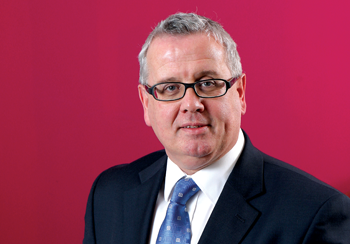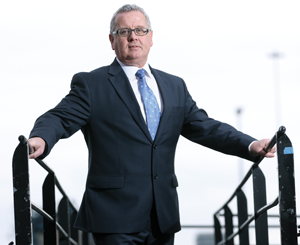Consilium: going mobile
 Northern Ireland can take the lead in developing mobile technologies and generate new jobs for graduates. Consilium Chief Executive Colin Reid shares his ambitious vision for the sector with Owen McQuade.
Northern Ireland can take the lead in developing mobile technologies and generate new jobs for graduates. Consilium Chief Executive Colin Reid shares his ambitious vision for the sector with Owen McQuade.
Maximising the benefits of mobile technology can make organisations more productive and help citizens hold government to account, Consilium Chief Executive Colin Reid believes. However, the Executive needs to radically change tack on how it attracts ICT investors to Northern Ireland, by prioritising software product companies, especially in emerging growth areas such as mobile and cloud computing.
“It plays very much to the austerity agenda,” Reid says of his company’s key product, TotalMobile. “We’re having less people but actually the demands aren’t reducing, in the sense of the amount of work that has to be done, and the pressures of doing it. And the compliance-type issues aren’t going away. We think our solution very much plays to that.”
Turning to foreign direct investment, he wants Invest NI to confidently set out that Northern Ireland will be a leader in new technologies such as mobile software and harness existing R&D in universities and the private sector.
“On the inward investment side, they need to be much more targeted and not just be bringing in call centres and IT departments,” he states. “Fair enough, they create jobs but they also hoover up good graduates that indigenous software companies need.”
“Go out there and target software product companies that will carry out leading edge software development in Northern Ireland and then sell those products globally,” suggests Reid. Northern Ireland could be used as a test market for software products before they go global, and help emerging international software companies break into Europe. Moreover, the likelihood is that these sort of companies will spawn new businesses in time, unlike call centres and IT departments.
Consilium’s main focus is producing software applications for the government market, although it is now branching out in the private sector. It started off in financial management systems before moving into works managements systems for ‘blue collar’ staff.
Founded in 1985, in one room in East Belfast’s Portview Trade Centre, Consilium moved to Antrim Technology Park in 1987 and has just moved to its new headquarters at Pilot Point in Clarendon Dock, North Belfast. The company has 110 employees, including 15 in Britain and 12 in the USA.
“Originally, the business was dealing only with customers in Northern Ireland,” he relates. “We moved out to the technology park in Antrim in the late 80s.
“The focus at the minute is mainly on the TotalMobile product, which we’ve brought out in the last few years. Really, it’s our software that runs on things like iPad, iPhones, androids, smartphones and it’s aimed at any mobile worker.
“If it’s a case worker, all the previous case history will be on their device. And then, when they’re out there, they can do all the electronic data collection and, in real time, get the information back into the centre of the organisation so that managers or supervisors know exactly where their staff are at any point in time and what the status of work is.”
Consilium’s clients typically make 20-40 per cent savings through mobile working. Reid points to Aberdeen City Council, which is saving £1.5 million per year and has a mobile workforce of 225 staff.
The benefits are three-fold. Administration, firstly, is done as a by-product of work. Staff press a button to register when they accept a job, arrive and finish a visit, thus creating an electronic time sheet.
Compliance is sometimes a greater driver than cost e.g. in children’s and social work, where a certain number of visits must be carried out. Mobile working enables managers to know where their staff are located (via GPS co-ordinates) at a point in time.
Finally, mobile working is a green solution, reducing the carbon footprint in paper usage (e.g. no pre-printed triplicate forms) and unnecessary car journeys.
Most organisations are in the early stages of mobilising a more mobile workforce. The first stage, in many cases, is giving executives access to email outside office. However, more and more people are looking at software applications and how to automate their business processes.
“I’ve been in the software industry for a long time and mobile is the first technology that I’ve ever come across where the consumer is driving the enterprise,” he comments. IT in work began with PCs, which gradually made their way into the home. The reverse is true in mobile technology, with “nearly all organisations, particularly government organisations, playing catch up with the consumer”.
Citizenship
The company was rewarded with a medal for the 2011 Mobile IT Innovation of the Year at the UK IT Awards. In particular, the award recognised how TotalMobile was promoting good citizenship by offering residents free apps to report local problems.
A resident, for example, can take a photo of graffiti or an abandoned vehicle and fill out a brief form to give more details. This is then sent through electronically to a government agency, and the sender can get updates or ‘nag’ the recipient if the response is delayed.
Clients can also use the real-time data generated by TotalMobile to publicise their work on twitter and facebook: “Again, it’s a good way of not just authorities doing the work but actually letting people know all the good things they’re doing but without any extra overhead of trying to communicate.”
This fits in with the drive for releasing public data and can take some cost out of the system by cutting down on Freedom of Information requests and unnecessary calls.
“You’re making your organisation more productive,” he adds, “but at the same time, you’re making it more accountable to people and letting them know what’s going on.”
Achievements
When he became Managing Director in the late 1990s, “the company was neither a lifestyle or growth business”.
“To be honest, I think, in technology you can’t be a lifestyle business,” Reid reflects. “It just changes so much. You’re always going to have to make an investment, so you might as well embrace it and go for it.”
Along the way, highlights have included opening the company’s first office, and gaining the first customer, outside Northern Ireland in the early 1990s. The stretch of water between the province and Great Britain was a psychological barrier, as was Consilium’s small size and the Troubles. That said, it was a necessary step as the local government market was limited in Northern Ireland.
“I think you almost go in with an inferiority complex that we’re a small company from Northern Ireland and then you go over into GB,” he reflects. “And then you find that customers think you give very good service and that your product’s good, and suddenly think: ‘We’re as good, if not better, than the competition.’”
More recent achievements include the development of TotalMobile, opening up in the USA and getting blue chip companies, such as Capita, AT&T and Vodafone as partners. Seeing people grow has also proved satisfying. Chief Technology Officer Gareth Tolerton started as an implementation consultant while Sales and Marketing Director Ronnie Geddis started as a developer.
Key challenges have included raising venture capital funding, managing the finances (including through two recessions) and keeping abreast of changes in technology.
Another major challenge is building an effective partner channel. Getting the right partner, and access to their sales staff on the ground, is important: “When you’re selling directly, it’s tough but you’re in control of it at least. It’s your own destiny. When you’re working with a partner, you’re one step removed.”
 Working with partners is also helping to grow Consilium’s market share. Capita UK has taken on TotalMobile, to sell to its customers. Deals have also been signed with Serco, vodafone UK, AT&T in USA and several software partners with US Government contracts.
Working with partners is also helping to grow Consilium’s market share. Capita UK has taken on TotalMobile, to sell to its customers. Deals have also been signed with Serco, vodafone UK, AT&T in USA and several software partners with US Government contracts.
“Part of solving the austerity p
roblem is a big move to outsourcing not just the IT but also the service,” he remarks. “That’s why we deliberately targeted those companies as partners. We could see that trend coming.”
Capita has a back-end software product but TotalMobile has helped it to integrate that with case work. The company provides several services to Southampton City Council.
After entering the US market, by opening an office in Boston, Consilium is expanding its healthcare business. This work started with supporting domiciliary care and social workers, but it now helps visiting nurses (employed in America by the private sector).
In Arkansas, state government staff use the TotalMobile solution for mobile flu clinics in community centres. A driving licence is scanned to populate the form and real-time information is brought back to the epidemiologist. People also need that information to claim for health insurance.
The need for health-related ICT will increase with an ageing population and the move to care for more people in the home. Telemedicine can generate job requests for nurses e.g. triggering a signal to a smartphone when a blood pressure reading rises.
Another application, also in the USA, processes information on young offenders, making sure that the right person appears in court, and that staff are aware of offenders’ medication and past behaviour. This can help to protect lone workers as offenders are increasingly monitored in the community.
“While we’ve been innovative, it’s always with a purpose to bring proper benefits to the customers. We’ve a twin-track approach so that we’re looking at our customers and down the line, what challenges they face and what that’s likely to mean for them. And then we’re obviously looking at all the new technologies that come about.”
Fifteen years ago, Consilium was an early mover into web and open systems. Adding the mobile software allows customers to utilise “rich data” such as status changes, photos and GPS co-ordinates. Indeed, an employee can bring “everything from the last inspection” to the next one.
The company consciously decided to go for mobile technology “in a big way” and produce a product that could go into as many settings as possible. The Chief Technology Officer and other staff were separated and moved to a new office in 2007 (virtually a separate business) in the Northern Ireland Science Park. That worked “very well” and the process moved on quickly. A separate operation made it easier for Capita to sign up.
Reid uses the phrase “God made the world in seven days but he didn’t have an installed base” i.e. it’s harder to innovate once you have customers and contracts. His advice to developers is: “Don’t be distracted, do it quickly and don’t make any compromises.”
Time to accelerate skills
As a former chair of Momentum, the ICT industry group, Colin Reid sees “huge opportunities” for the Northern Ireland sector but progress is being held back by a major skills shortage, particularly for really good software developers.
“I don’t think enough has been done over the last number of years, or is being done, by all of us” he comments. “Now, I know Invest NI is out there saying: ‘We’ve got skills, come here and set up and at a relatively low cost.’ But we haven’t got enough skilled staff and it’s putting pressure on the indigenous companies.”
Why not target Invest NI’s underspend to ICT skills, he suggests, including a major advertising campaign on the career benefits: It’s a message for parents as much as young people.
Profile: Colin Reid
Colin holds a BA Hons in business studies, an MSc in executive leadership and a diploma in company direction. He started his career in local government and held a number of positions with Down District Council and then Newry and Mourne District Council, including Internal Auditor and Finance and IT Manager. After lecturing at Down College for a couple of years, he joined TASK Software (now Consilium Technologies) as Commercial Director. He became CEO of TASK in 1997, where he has overseen the growth of the business from £750,000 to £10 million. Colin was recently appointed a board member for QUBIS, Queen University’s commercial research arm. He is a Chartered Director and active on a number of IoD committees.
Married to Joyce with two grown-up daughters and a grand-daughter, he describes himself as a “serious Man United supporter and non-serious golfer”. His last game at Old Trafford was the 8-2 thrashing of Arsenal.







